Experience & Experiences
I have had many opportunities that have let me explore my path and determine what I want to do. From fieldwork on a Mexican island to Machine Learning research, I’ve capitalized on many opportunities and gained life-defining experience.
Below, you’ll find three of my highlights: my work at INTERA Inc., an ML research internship at the University of Texas, and the research experience that sparked my interest in this field.
Under the three highlights is a summary of my other experiences that have led me to where I am today. If you have any questions, please reach out and ask!
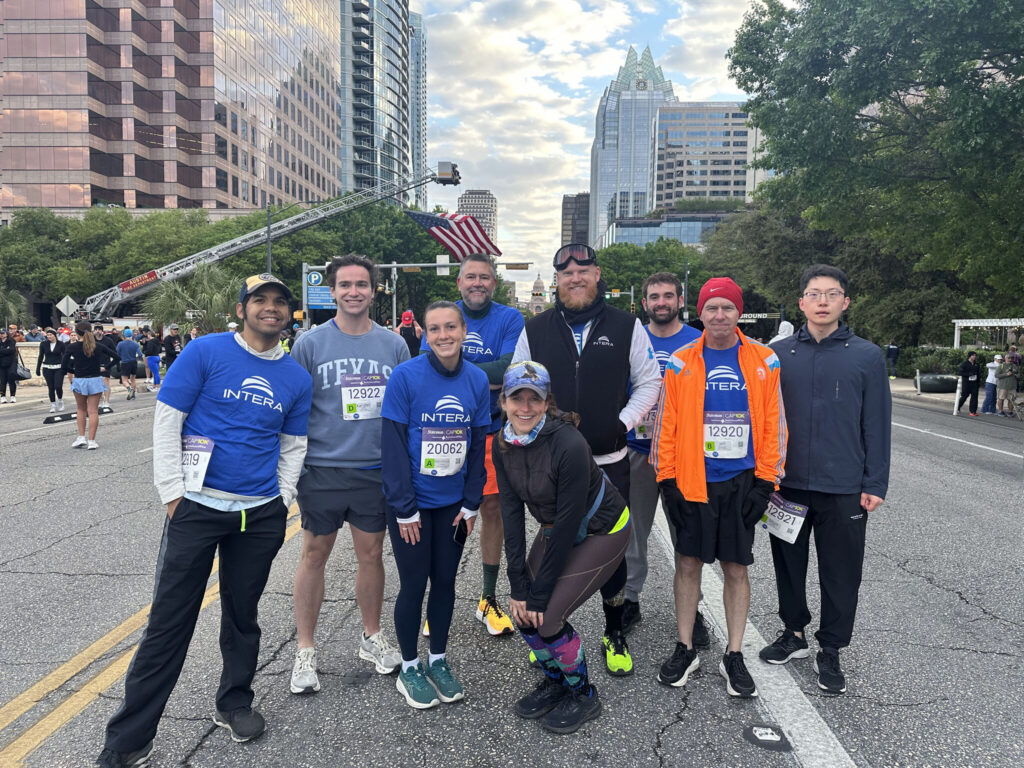
INTERA’s Austin office 5k in March 2025.
Groundwater Modeler | INTERA Inc.
My responsibilities revolved around supporting the development of numerical models for groundwater flow at the Hanford Site. I created and managed model inputs, developed and refined Python- and R-based post-processing workflows, and integrated large monitoring datasets. I also performed geospatial analysis in ArcGIS Pro and Python to prepare model boundaries, grids, and well datasets. In addition, I generate and analyze outputs from MODFLOW and MODPATH, including residual plots, concentration–pumping overlays, and time-series visualizations, ensuring quality control through automated filtering and validation. My work supports the team in compiling and interpreting data for calibration, scenario analysis, and regulatory deliverables, as well as in preparing technical reports and presentations for clients and stakeholders.
Machine Learning Research | Hildebrand Department of Petroleum and Geosystems Engineering
The Research
This project was supervised by Dr. Maša Prodanović and Bernard Chang to optimize an existing machine-learning model designed to characterize 3D rock samples by estimating permeability. Existing physics-based models exist to determine permeability; however, they are computationally expensive and time-consuming. MS-Net bridges this gap by estimating permeability based on previously simulated data. My research aimed to incorporate the Fast Fourier Transform to increase the accuracy of MS-Net and reduce error.
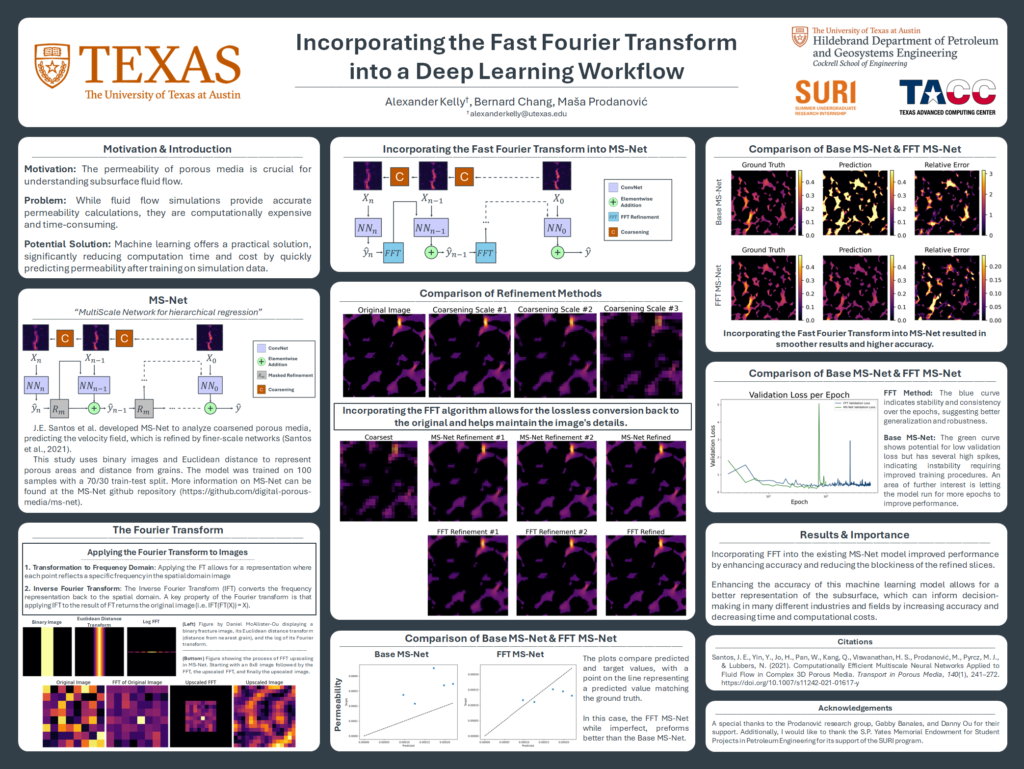
Results
Incorporating FFT into the existing MS-Net model improved performance by enhancing the accuracy and restoration of the digital image slices.
Enhancing the accuracy of this machine learning model enables a more accurate representation of the subsurface, which can inform decision-making in various industries and fields by increasing accuracy and reducing time and computational costs. My efforts during this research culminated in the poster “Incorporating the Fast Fourier Transform into a Deep Learning Workflow” (seen above).
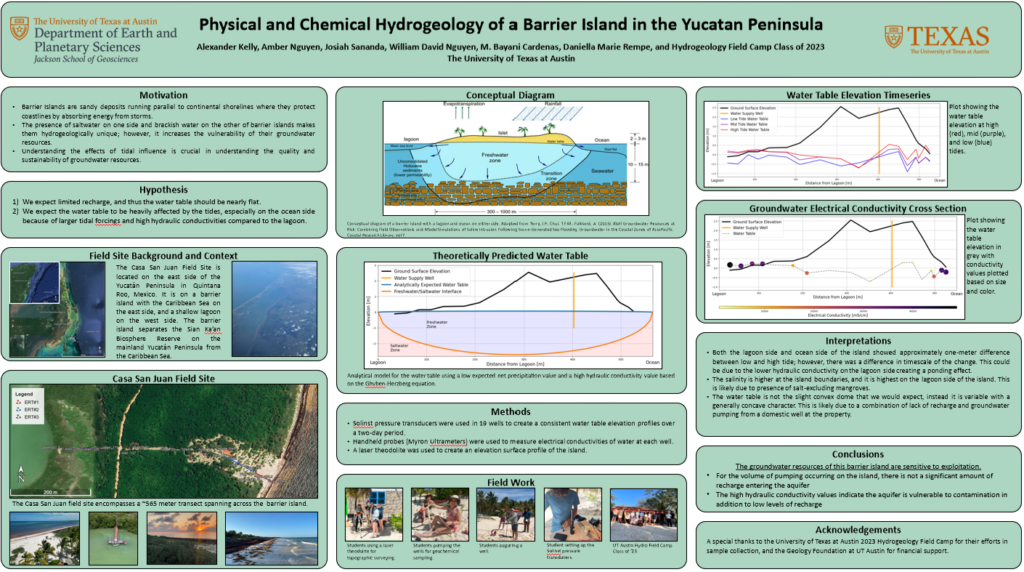
Groundwater Research | Jackson School of Geosciences
Background
This project, supervised by Dr. Bayani Cardenas and Dr. Daniella Rempe, aimed to characterize the hydrogeology of a barrier island in Mexico off the coast of the Yucatán Peninsula. Barrier islands are hydrologically unique due to saltwater on one side and brackish water on the other; however, this, paired with tidal influences, increases the vulnerability of their groundwater resources.
Results
We determined that this island’s groundwater is highly vulnerable to overpumping and is significantly influenced by tidal effects. This wasn’t necessarily a shocking conclusion (after all, the island is only about 50m long, or about half a football field for any Americans); however, it was exciting and rewarding to see a direct application of hydrogeology and to see how it affects people’s daily lives. I presented this research at the American Geophysical Union 2024 in San Francisco as the poster “Physical and Chemical Hydrogeology of a Barrier Island in the Yucatan Peninsula”. I credit this project for kick-starting my research interest.
Work Experience
In terms of variety of interaction, this job ranks very high on my list. The Earth Science and Sustainability class is an undergraduate geosciences class geared towards non-STEM and non-geoscience majors. This presented a really fun challenge for me: how do I clearly communicate (sometimes) difficult earth science concepts to people who don’t have a similar educational background.
In this role, I helped collect data for the Rempe lab at the Jackson School of Geosciences at the White Family Outdoor Learning Center in Dripping Springs, Texas. Some of the tools and methods I used included:
- Nuclear Magnetic Resonance Probe
- Groundwater depth measurements
- Measuring CO2 emissions from soil
This job helped hone my field skills and data collection/management techniques, and in the summer of 2024 we installed a Vadose Zone Monitoring system (VMS) to further allow us to characterize the near subsurface.
This job taught me a lot about coordination and project management. It taught me how to get the right materials and equipment where they needed to be, but more importantly, how vital it is to have the right person for the job.
As a Project Management Intern for Davenport Builders, I developed systems to integrate Excel and PlanSwift, enhancing the efficiency of the project bidding process. I also aided in the coordination of material, personnel, and equipment across 23 job sites.
This was my first real job, and it taught me a lot about work and what to expect in the professional world. I learned about the importance of accuracy, communication, and professionalism.
As a Construction Estimator Intern for Davenport Builders, I worked with the project manager, architects, sub-contractors, and homeowners to build the most accurate cost estimate models possible.
Leadership Experience
The KBH Student Advisory Council aims to facilitate student growth and professional advancement while acting as the voice for UT students interesting in Energy. As a council member, I served as a representative of the KBH center and student body, engage in biannual council meetings as well as various events, including student gatherings, energy treks, and additional opportunities to advocate for student interests and concerns.
This was a really interesting and rewarding experience for me because it opened my eyes to the diversity in the energy industry. Prior to joining the council, my understanding of the energy industry was focused on the geoscience aspects of it, but the KBH Center is more policy and business focused which has given me the opportunity to advance my understanding of the Energy Industry as a whole.
AAEES is the American Academy of Environmental Engineers and Scientists, a professional organization dedicated to environmental engineering and science. As the VP of External Affairs for the University of Texas at Austin chapter, I was in charge of corporate outreach and sponsorship in addition to the general management and organization of the club.
The Jackson Scholars Program aims to cultivate scientific and community leadership among students. It encourages engagement in geoscience-related scholarship, outreach, and service, in addition to traditional learning. The program emphasizes developing leadership, professional, and community service skills, providing students with a well-rounded portfolio of accomplishments for future endeavors. As part of my membership within the organization, I engaged in leadership, study abroad, and research.
As a peer mentor, my role is to help underclassmen fulfill their requirements by highlighting academic and professional opportunities.
Fun fact: my mentors in Jackson Scholars are the one’s who suggested I make this portfolio!
Geoscience Ambassadors is an outreach program aiming to expand and diversify the geoscience community by empowering geoscience students to share their personal journeys and experiences with individuals and communities. Through reflection and storytelling, the program encourages students to inspire others to pursue paths in the geosciences. A large part of what I did as an Ambassador was to help brainstorm outreach ideas for how to better communicate geoscience goals and activities to those who haven’t been exposed to geoscience before.
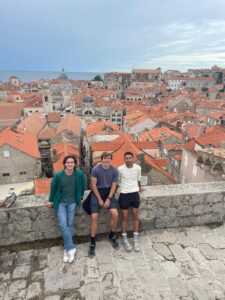
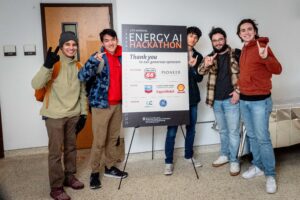
(Top) Energy AI Hackathon, 2024
(Left) Croatia Study Abroad, 2023
Other Experience
Hydrogeology Field Camp (HFC) was a course for me; however, it was more of an experience than a class. HFC taught me the basics of field hydrology, where I learned how to stream gauge, well log, perform chemical analysis, make maps, and more. The highlight of the course occurred when we took all our equipment and flew down to Tulum, Mexico, to do fieldwork on the cenotes and a barrier island.
The fieldwork we did was a valuable experience because it exposed me to various techniques; however, what stands out is what that experience taught me about being a global citizen and scientist. I learned how what I study in class affects people’s day-to-day lives; what I had spent the previous three years studying stopped being academic and became real.
After the class concluded, I asked the professors if I could continue working with the data we had collected. I wanted to learn more about what we did and dig deeper into the impacts of our research. They agreed, and I continued to work on the project and eventually attended the 2023 meeting of the American Geophysical Union, where I presented my poster, “Physical and Chemical Hydrogeology of a Barrier Island in the Yucatan Peninsula.”
During the Summer of 2023, I had an incredible study abroad opportunity led by two of UT’s Petroleum and Geosystems Engineering department professors: Dr. Maša Prodanović and Dr. Michael Pyrcz. I had an amazing experience exploring Croatia with its unique natural beauty and industrial presence. While Croatia is renowned for its stunning coastline, rock formations, and historical cities, I discovered another dimension of the country through visits to oil and gas platforms.
The program offered a deep dive into numerical methods and spatial data analytics, highlighting their relevance to subsurface problems. Outside of class, there were lots of important lessons and experiences:
- National Parks: Exploring national parks showcased prime examples of karst hydrogeology, offering breathtaking views and valuable learning opportunities.
- PESS Conference: Attending talks at the local petroleum engineering conference in Dubrovnik expanded my understanding of industry trends and provided a platform for networking with professionals.
- Dubrovnik: Spending time in Dubrovnik, a UNESCO Cultural Heritage site, allowed us to appreciate Croatia’s rich history and architectural wonders.
Overall, the program enriched my academic knowledge and fostered lasting friendships with students from the University of Zagreb. It was a transformative experience that broadened my scientific and cultural perspectives.
Hosted in San Francisco, AGU ’23 is one of the largest meetings of geoscientists across the globe. It was also my first experience presenting my research. The poster I presented, titled “Physical and Chemical Hydrogeology of a Barrier Island in the Yucatan Peninsula,” was the culmination and analysis of my fieldwork in Quintana Roo, Mexico. Attending AGU was a significant experience because it highlighted the variety inherent in the geosciences. I connected and talked with a wide variety of people, from professors to professionals; I had the opportunity to see what was going on globally in geoscience.
The most enriching aspect of AGU ’23 was the feedback I received. There were so many different people with different opinions, thoughts, and theories about my work, many of which I had yet to consider. Talking with so many amazing people helped me think through my research and think about what I would’ve done differently and what I would do differently on my next research project.
This hackathon was the fourth annual PGE Energy AI Hackathon at UT. I led a team of five to tackle a data science challenge using Python. Together, we delved into data analytics and machine learning to address a subsurface energy problem. We focused on a sparsely populated dataset, requiring data analysis and feature elimination to identify critical factors for our machine learning model. It was an exciting (but exhausting) experience collaborating with my team to find innovative solutions to complex issues. It took place over a weekend; completing the project was an intense effort, but despite the difficulty, it was a gratifying and rewarding experience!
McCombs Summer Institute was an eight-week program designed to enhance business acumen and career readiness. From discussions and mock interviews to resume workshops and stock market simulations, I sharpened my skills understanding of the world of business.
As part of MSI, I took finance, accounting, law, marketing, and management classes where I learned the basics of business. This was an incredibly interesting and rewarding experience because it exposed me to aspects of industry that I had never heard of before.